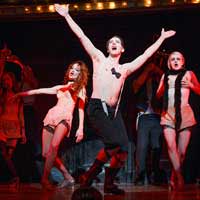Cabaret (2016 National Tour)
Book by Joe Masteroff
Music by John Kander
Lyrics by Fred Ebb
Directed by BT McNicholl
Originally Directed by Sam Mendes
Originally Co-Directed and Choreographed by Rob Marshall
Produced by Broadway in Chicago and Roundabout Theatre Company
Cabaret has become one of the most popular and widely-performed American musicals since its debut fifty years ago, and the 1972 film, directed by Bob Fosse, was Liza Minelli’s most famous dramatic performance. But younger theatre-goers probably associate it most readily with Roundabout Theatre’s 1998 production (itself based on Sam Mendes’s 1993 London revival), which displayed ribald sexuality and minimal set or attempt at illusion. Roundabout revived their production in 2014, and now, the national tour is providing American theatre-goers with another chance to see this landmark in its full glory. But despite its reputation for brashness (and possibly because of some issue with monitors and other sound equipment at opening), this seems to be an unusually contemplative Cabaret. Rather than focusing on doomed lovers Cliff Bradshaw (Lee Aaron Rosen) and Sally Bowles (Andrea Goss), this production foregrounds the residents of Berlin, and the tragic consequences of their disastrous choices.
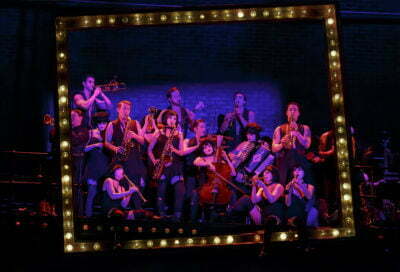
Early in the 1930s, aspiring novelist Cliff Bradshaw arrives in Berlin in search of inspiration. He immediately befriends a smuggler, Ernst Ludwig (Ned Noyes), who recommends to him cheap lodgings with Fräulein Schneider (Shannon Cochran), and the nearby Kit Kat Klub. Both are awful, but cheap, and provide plenty of opportunity to meet interesting people. The Klub’s emcee (Randy Harrison) guides us through the story, leading his ensemble in songs that thematically reflect Cliff and Schneider’s attempts at finding love. Cliff sees the British performer Sally Bowles just in time for her to get fired, and she charms him into sharing his room with her. When he learns she’s pregnant, they plan to spend the rest of their lives together. Fräulein Schneider is being courted by Herr Schultz (Mark Nelson), the owner of a fruit store, and one of the few people around who still is comfortable financially. But Herr Schultz is also Jewish, and therefore at extreme risk from the rising Nazi party, as are the sex-workers and non-conformists at the Klub. They all remain in denial until it’s too late.
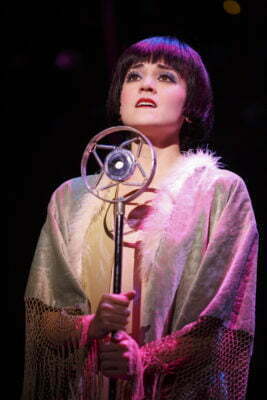
Over the course of Cabaret’s many productions, several songs have been written for Cliff. Mendes and Rob Marshall’s version does not use any of them, except for “Perfectly Marvelous,” his soothing, seductive, but somehow insincere-sounding early-show duet with Sally. They do, however, retain all of the dialogue regarding Cliff’s homosexuality, which even the Nazi Ernst detects within minutes of meeting him at the beginning of the play. Cliff becomes enraged whenever somebody explicitly discusses this part of him, and insists he wants to lead a normal life with Sally, but by the end of the show, she says she’s convinced that once they have a baby, he’d run off with it and a male lover. Andrea Goss is an interesting choice for Sally, because she’s short and wiry, and her girlishness is emphasized by the staging of her song “Don’t Tell Mama,” which includes an oversized chair for her to sit in like a doll. And while she sounds tempted by the offer of a stable home life in “Maybe This Time,” her lack of conviction while singing it implies a consciousness that the answer to that “maybe” is most likely “no.” In her final song, appropriately enough called “Cabaret,” Goss unleashes so much pent-up anger that it is clear Sally has been wanting to get it off her chest for the entire show.
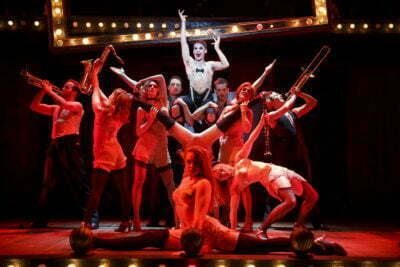
So if outsiders Cliff and Sally do not really reflect a Berlin worth saving, or even a real romance, who does? Chicago native Shannon Cochran gives a magnificent performance as Fräulein Schneider, the German woman who is kind, but the ultimate survivor. Cochran displays enormous vocal power in her final song “What Would You Do?” Her romance with Herr Schultz is one the audience can get invested in, even though it contains a rare moment of over-staging for this production. Cabaret’s bookwriter Joe Masteroff focused mainly on the world of the marginalized, radical, and queer, but the relationship between Schneider and Schultz represents the betrayal of the European Jewry by wider society, and does so devastatingly.
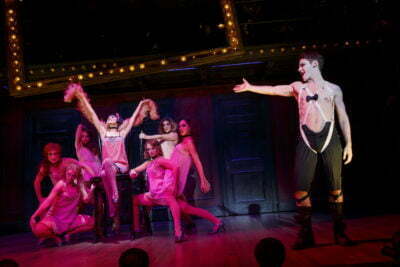
The emcee is the face of Cabaret, and Randy Harrison is an excellent one. This production shows lots of sex without making it look very sexy—Robert Amodeo’s make-up design is a little on the grotesque side, the male cabaret performers look like they think they’re barely being paid enough to be gay—but Harrison is actually quite charming. His rendition of “Money” is bitterly satirical, and he’s a true drag diva in “I Don’t Care Much.” Contrasting his warmth is the chilling Nazi anthem “Tomorrow Belongs to Me,” a truly frightening moment at the end of Act I which the directors use Harrison to subvert right before the lights go down. This was the most controversial decision in the show among those I talked to, but I was glad for it. I was less pleased with a poorly-placed disco ball that blinded me during “Married” and a few shorter sequences, and those who could see reported there were other lighting problems as well. But if a few technical glitches on opening night are the only things wrong with a musical production that contains moments of authentic emotion, along with John Kander’s period-appropriate music and Rob Marshall’s sensuous choreography, then that production is a great success.
Highly Recommended
Jacob Davis
[email protected]
Reviewed February 10, 2016
For more information, see Cabaret’s page on Theatre in Chicago.
Playing at The PrivateBank Theatre, 18 W Monroe, Chicago. Tickets are $25-108; to order, call 800-775-2000 or visit BroadwayinChicago.com. Plays through February 21. Running time is two hours and thirty minutes with one intermission.

